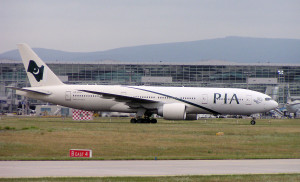PIA Privatization Strike: Costly For All
 On February 2, Pakistani security voices shot and killed two employees affiliated with Pakistan National Airlines (PIA)in Karachi during a violent altercation. Police officials worked to subdue protesting airline workers with tear gas and water cannons after employees attempted to prevent entry into Jinnah International Airport. While the perpetrator of the shootings has not yet been identified, the police have denied responsibility for the employees’ deaths. The PIA Joint Action Committee (JAC) has filed criminal charges for the incident against executive officials closely affiliated with Prime Minister Nawaz Sharif.
On February 2, Pakistani security voices shot and killed two employees affiliated with Pakistan National Airlines (PIA)in Karachi during a violent altercation. Police officials worked to subdue protesting airline workers with tear gas and water cannons after employees attempted to prevent entry into Jinnah International Airport. While the perpetrator of the shootings has not yet been identified, the police have denied responsibility for the employees’ deaths. The PIA Joint Action Committee (JAC) has filed criminal charges for the incident against executive officials closely affiliated with Prime Minister Nawaz Sharif.
The shootings mark an escalation in a PIA employee strike that had begun on January 27 under the direction of the JAC. The subject of the ongoing strike involves the Pakistani government's plans to privatize the airline, an action made possible by the passage of the (PIA) Corporation Conversion Ordinance in December 2015.
Privatization was intended to address the airline’s persistent profit losses and structural flaws, including operational mismanagement. The government, for its part, has denied that privatization will result in employment loss: according to Finance Minister Ishaq Dar, its primary effect will be to increase business.
Government officials have also refused to hold talks with airline employees until the strike ends. They have also initiated legal action against the workers which, according to the Pakistan Essential Services Act of 1952, may result in their imprisonment. The JAC adopted a similar hardline approach after initiating the strike, refusing to negotiate with the government until the privatization decision was reversed. Its current stance remains unclear.
Regardless of each party’s position, the lack of compromise has proven costly to all who are affected by the airline’s operations. PIA employees have suffered injury and loss of life, and many of their airport entry passes have been revoked. The airline itself has sustained considerable financial losses: as of Friday, the third day of flight suspension, revenue losses amounted to Rs. 2.5 billion.
Moreover, at least 36,000 passengers have been negatively impacted by the cancellation of domestic and international PIA flights, as well as by the subsequent failure of private airlines to accommodate their confirmed tickets. Besides facing difficulties related to flight and airport access, passengers have also been subject to drastic increases in the cost of airfare.
The government’s current approach to the conflict offers little hope for the long-term resolution of such issues: it has indicated potential plans to establish a separate airline company with operations parallel to those of the PIA, a decision that may exacerbate uncertainty over the fate of both the airline and its employees.
